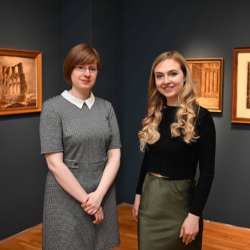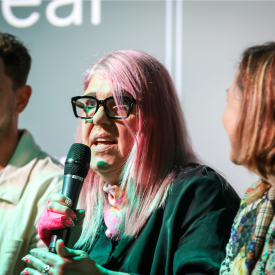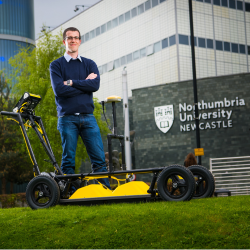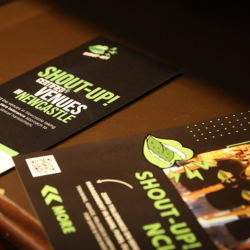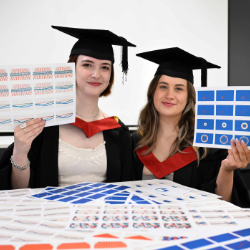-
Study
-
UCAS Clearing 2024
- Clearing Courses
- The Clearing Process
- UCAS Tariff Points
- Clearing 2024 FAQs
- Confirmation
- Clearing Virtual Event
-
Undergraduate
- Search for a Course
- Undergraduate Open Day & Events
- Application Guides
- Northumbria University UCAS Exhibitions
- Foundation Years
- Undergraduate Fees & Funding
- School & College Outreach
- Continuing Professional Development
-
Postgraduate
- Postgraduate Study Degree
- Postgraduate Research Degrees
- Postgraduate Open Days and Events
- Postgraduate Fees & Funding
- Flexible Learning
- Thinking about a Masters?
- Continuing Professional Development
- Change Direction
-
Student Life
- The Hub - Student Blog
- Accommodation
- Life in Newcastle
- Support for Students
- Careers
- Information for Parents
- Students' Union
- Northumbria Sport
-
-
International
International
Northumbria’s global footprint touches every continent across the world, through our global partnerships across 17 institutions in 10 countries, to our 277,000 strong alumni community and 150 recruitment partners – we prepare our students for the challenges of tomorrow. Discover more about how to join Northumbria’s global family or our partnerships.
View our Global Footprint-
Applying to Northumbria
- European Union
- Our London Campus
- Northumbria Pathway
- International Events
- Entry Requirements and Country Representatives
- Regional Offices
-
Northumbria Language Centre
- Faculty Requirements
- Acceptable English Requirements
- Pre-Sessional English and Study Skills
- Academic Language Skills Programmes (ALS)
-
International Fees, Funding & Scholarships
- International Undergraduate Fees
- International Undergraduate Funding
- International Masters Fees
- International Masters Funding
- International Postgraduate Research Fees
- International Postgraduate Research Funding
- International Money Matters
-
Life at Northumbria
- International student support
- Careers
-
International Mobility
- Current Northumbria Students
- Incoming Exchange Students
-
-
Business
Business
The world is changing faster than ever before. The future is there to be won by organisations who find ways to turn today's possibilities into tomorrows competitive edge. In a connected world, collaboration can be the key to success.
More on our Business Services -
Research
Research
Northumbria is a research-rich, business-focused, professional university with a global reputation for academic quality. We conduct ground-breaking research that is responsive to the science & technology, health & well being, economic and social and arts & cultural needs for the communities
Discover more about our Research -
About Us
-
About Northumbria
- Our Strategy
- Our Staff
- Place and Partnerships
- Student Profiles
- Alumni Profiles
- Leadership & Governance
- Academic Departments
- University Services
- History of Northumbria
- Contact us
- Online Shop
-
-
Alumni
Alumni
Northumbria University is renowned for the calibre of its business-ready graduates. Our alumni network has over 237,000 graduates based in 178 countries worldwide in a range of sectors, our alumni are making a real impact on the world.
Our Alumni - Work For Us
What will I learn on this module?
In this module you will engage in a research driven exploration on performer training; building on the foundations set by practitioners from the late 20th and early 21st centuries you will investigate new modes of performer training and think through the ways that training processes and practices may need innovating for the contemporary world. Working with staff on their specialist areas of research and practice, the precise focus and thematic direction of this exploration will be devised collaboratively with your tutor(s) to develop from their expertise. You will situate their own practical methods of preparing for performance in the context of the 21st century before moving on to begin developing your own performer training ‘vocabularies’. The overall aim of this module is to challenge you to consider alternative methods of performer training and prepare you for advising, developing and honing performance techniques that reflect the ethics of contemporary and future cultural sectors.
How will I learn on this module?
Framed by seminar discussions where appropriate, sessions will follow a workshop model with performance exercises and sharing of work in progress as an integral part. Each week you will be offered tuition on specific methods and techniques for rehearsing and presenting bodies on stage with your fellow actors and with an audience. You will engage in show-back sessions where you will give and receive constructive formative feedback in participation with tutors.
How will I be supported academically on this module?
As well as specific show back feedback, due to the experiential and discursive nature of the learning in this module there will be lots of opportunity to get tutor feedback on your work and the progress you are making throughout the module.
Information and resources will be available to you on Blackboard and the 'Reading List' contains links to websites and online video material which can help you develop appropriate knowledge and understanding.
Written assessment feedback will be provided within 20 working days of summative assignment submission. Access to library facilities is available 24-7 all year round.
What will I be expected to read on this module?
All modules at Northumbria include a range of reading materials that students are expected to engage with. The reading list for this module can be found at: http://readinglists.northumbria.ac.uk
(Reading List service online guide for academic staff this containing contact details for the Reading List team – http://library.northumbria.ac.uk/readinglists)
What will I be expected to achieve?
Knowledge & Understanding:
• Articulate a persuasive critical understanding of how performer training techniques emerge from, or in response to, broader cultural, political, or ethical contexts
Intellectual / Professional skills & abilities:
• Evidence an ability to interrogate complex ideas through a selected practice
Personal Values Attributes (Global / Cultural awareness, Ethics, Curiosity) (PVA):
• Consider the roles of global, national or local politics in the presentation of bodies on stage
How will I be assessed?
Formative
Students will share their argument in response to the set provocation as an oral presentation. Staff and peers will offer feedback in class.
Summative
Practice Research project (100%) comprising:
• A demonstration of practice (c. 5 – 10 minutes, as appropriate to form of practice and in discussion with tutor);
• A 1000-words (or equivalent) statement contextualising the practice research demonstration.
In response to a staff provocation or live brief, you will work in small groups to develop, rehearse and realise a practical response (such as performance, workshop, installation or another agreed other format) that investigates the intersection of practice and theory.
The format of the practical demonstration will be agreed in discussion with the module convenor. The 1000 word (or equivalent) research statement will outline the critical and creative references that have informed the project, and how they have done so
Pre-requisite(s)
N/A
Co-requisite(s)
N/A
Module abstract
The challenge set by this module is to ask if performer training is still fit for purpose and, if not, what will replace it? Building on the foundations set by practitioners from the late 20th and early 21st centuries, you will investigate new modes of performer training and think through the ways that training will need innovating for the contemporary world. Working with staff on their specialist areas of research and practice, the precise focus and thematic direction of this exploration will be devised collaboratively with your tutor(s). Situating tutors own practical methods of preparing for performance in the context of the 21st century, you will move on to begin developing your own performer training ‘vocabularies’. The overall aim of this module is to challenge you to consider alternative methods of performer training. It prepares you for developing and honing performance techniques that reflect the ethics of contemporary cultures.
Course info
UCAS Code W405
Credits 20
Level of Study Undergraduate
Mode of Study 3 years Full Time or 4 years with a placement (sandwich)/study abroad
Department Northumbria School of Design, Arts and Creative Industries
Location City Campus, Northumbria University
City Newcastle
Start September 2024 or September 2025
All information is accurate at the time of sharing.
Full time Courses are primarily delivered via on-campus face to face learning but could include elements of online learning. Most courses run as planned and as promoted on our website and via our marketing materials, but if there are any substantial changes (as determined by the Competition and Markets Authority) to a course or there is the potential that course may be withdrawn, we will notify all affected applicants as soon as possible with advice and guidance regarding their options. It is also important to be aware that optional modules listed on course pages may be subject to change depending on uptake numbers each year.
Contact time is subject to increase or decrease in line with possible restrictions imposed by the government or the University in the interest of maintaining the health and safety and wellbeing of students, staff, and visitors if this is deemed necessary in future.
Useful Links
Find out about our distinctive approach at
www.northumbria.ac.uk/exp
Admissions Terms and Conditions
northumbria.ac.uk/terms
Fees and Funding
northumbria.ac.uk/fees
Admissions Policy
northumbria.ac.uk/adpolicy
Admissions Complaints Policy
northumbria.ac.uk/complaints






